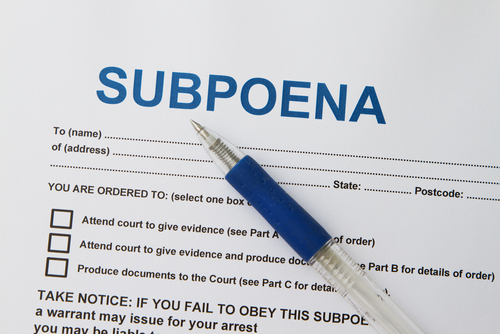When reviewing a district court’s decision on whether to enforce or quash a subpoena issued by the Equal Employment Opportunity Commission (EEOC), appellate courts should determine if the district court abused its discretion, rather than conducting a new review of the subpoena enforcement, according to the U.S. Supreme Court. All eight justices agreed that the proper standard of review of an EEOC subpoena enforcement decision is abuse of discretion, not de novo review. McLane Co., Inc. v. EEOC, 581 U.S. ___ (2017).
EEOC Subpoena Sought “Pedigree Information”
In the case before the Court, the EEOC was investigating a gender discrimination charge filed by a female distribution center employee named Damiana Ochoa. Ochoa had worked for eight years as a cigarette selector which required her to lift, pack, and move large bins of products. After Ochoa took three months of maternity leave, her employer required that she undergo a physical evaluation that tested her range of motion, resistance, and speed. The company required such tests of new employees as well as all those returning from medical leave. Despite attempting to pass the physical evaluation three times, Ochoa failed. The company fired her.
Ochoa filed a discrimination charge alleging, among other things, that she had been terminated on the basis of her gender. As part of its investigation, the EEOC asked the company to provide the agency with information about the physical evaluation test and individuals who had been asked to take the test. The company provided a list of anonymous employees who had been evaluated, providing each individual’s gender, role at the company, reason for the test, and evaluation score. The company refused, however, to provide what it called “pedigree information,” including the individual’s name, social security number, last known address, and telephone number.
When the EEOC learned that the company used its physical evaluation nationwide, the EEOC expanded the scope of its investigation, asking for information not only on gender but on potential age discrimination, and not only for the Arizona division where Ochoa worked but also for all of the company’s grocery divisions nationwide. The EEOC issued subpoenas requesting pedigree information related to its expanded investigation. The company refused to comply, so the EEOC sought to enforce its subpoenas in the Arizona district court.
District Court Quashed EEOC’s Subpoenas, But Ninth Circuit Reversed
The district court determined that the pedigree information was not relevant to the charges, as “an individual’s name, or even an interview he or she could provide if contacted, simply could not shed light on whether the [evaluation] represents a tool of . . . discrimination.” The district court refused to enforce the EEOC’s subpoenas.
The EEOC appealed to the Ninth Circuit Court of Appeals, where the applicable precedent indicated that the appellate court must review the district court’s decision to quash the subpoenas de novo (i.e., a completely new review). Concluding that the district court was wrong to quash the subpoenas, the Ninth Circuit reversed, finding that the pedigree information was relevant to the EEOC’s investigation.
The U.S. Supreme Court agreed to resolve a dispute among the Circuit Courts of Appeal on whether the proper standard of review is de novo, as was applied by the Ninth Circuit, or an abuse of discretion review, which other Circuits applied.
Supreme Court Decides Deferential Appellate Review Applies
The Supreme Court decided that a district court’s decision whether to enforce an EEOC subpoena should be subject to a deferential review, namely whether the district court had abused its discretion, rather than a de novo review. Recognizing that the Title VII provision that grants the EEOC subpoena power is the same as the authority granted to the National Labor Relations Board (NLRB) to issue subpoenas, the Court looked to the standard of review used when considering NLRB subpoena enforcement decisions. The Court found that every circuit that had considered that question had ruled that a district court’s decision whether to enforce an NLRB subpoena should be reviewed for abuse of discretion. In addition, almost every circuit other than the Ninth had applied the same deferential review to a district court’s decision whether to enforce an EEOC subpoena. Consequently, this “long history of appellate practice” carried weight with the justices for adopting an abuse of discretion standard in this case.
In addition, the Court focused on the case-specific nature of each EEOC subpoena enforcement decision. A district court must consider whether the evidence sought by the EEOC is relevant to the specific charge at issue and whether the subpoena is unduly burdensome in light of the circumstances. Believing that the district court is better suited than the courts of appeals to address these kinds of “fact-intensive, close calls,” the Court stated that the abuse of discretion standard of review was appropriate. Read more


 By
By